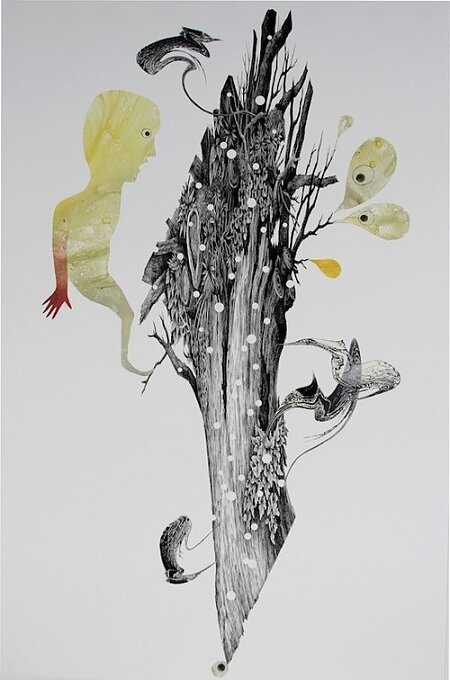
The Lion
The Elder’s face was stern, unmoving. “You will surrender your daughter tonight.”
“Tonight?”
“At sunset.”
The Elder walked away. His gold-encrusted carriage waited nearby, along with two fine donkeys impatient to resume their run. The yellow sand under their hooves shone with black bits of rock.
Zungvilda knew she would not give up her daughter. But what were they going to do? She had to warn Goombeldt. They had to run. Where? With endless spans of desert in every direction, the occasional towns were small stars in a gigantic sky of sand. The Elders had access to maps, but commoners weren’t allowed that privilege. Zungvilda sat down on the doorstep to think, but her mind was unfocused from fear. The sun was in the center of the sky, a burning eye whose gaze she couldn’t return.
She headed to the quarry, the Temple a great shadow far ahead, its tall slanted roof an arrow pointed at the empty sky.
The tired donkeys pulled, the wheels turned. The animals were bedraggled, sad—nothing like those in the Elder’s carriage. The workmen were busy with their hammers and wheelbarrows. The black rock they dug up here was in fashion in the cities far away—or so they had been told. Goombeldt was nowhere in sight. Zungvilda asked one of the workers.
The man’s face was uneasy. “They asked him to the conversation room.”
“Why?”
“I don't know.”
She knew.
The sun was grinding its teeth on her skull. Zungvilda found a shady spot next to a gigantic boulder that must have just been unearthed. She leaned on the rock, its surface strangely cool in this weather. She was horrified, but also tired, so tired. Tired of everything.
She must have dozed off. A hand touched her shoulder, and she opened her eyes to see Goombeldt, dust on his face, the ridges of his jaws strict in the stark light.
“They want to take Yenderia!” Zungvilda blurted.
“I know. They just told me.” He looked numb from the news. His eyes were so much older now. She remembered him as a young man. It wasn’t so much his body that had aged but his spirit.
“Who told you? One of the Elders?”
“Yes.”
“What did he say?”
“He said, You will surrender your daughter at sunset.”
“What are we going to do?”
“We must hide her.” Goombeldt’s face came to life, filled with intent, his blue eyes confident. “We are not going to give her up.”
“Yes, but where will we go?” Zungvilda’s features stiffened at the thought of their simple dwelling, their limited choices.
“Let’s not worry for now. We’ll figure it out this evening.”
Goombeldt’s shift was only halfway through, and Yenderia’s school was not over yet. Zungvilda was on her own, stuck with the terrible news, her insides tight, her head brimming with fear. She wanted to meet Yenderia after her classes, half hoping she would be the one to tell her daughter, half anxious about it.
Sitting there on a wooden
Why Yenderia, among all the young girls? Everyone knew some girls were taken away, but no one had the time or the energy to take it personally. She thought of the family three doors down. Their daughter had been selected for the sacrifice two years ago. The parents had seemed strangely accepting. Neither of them had been quite the same after; they turned into shadows. And if Goombeldt and Zungvilda didn’t think of something, tomorrow they would be shadows.
No one knew what the sacrifice was, but stories circulated. Some mentioned the Elders’ harems, some their depraved appetite for human flesh—but, in truth, no one was able to confirm these tales. The Elders came for the girl, and she was never seen again. A celebration was held the next day. Music played, its drums like little springs ready to burst. Kebabs were handed out, glasses filled with wine. No one seemed to mind, except for the parents.
When she was Yenderia’s age, Zungvilda had been in trepidation over it, like every girl. One day she had craved to be chosen, the next she had hoped to evade it. She burned with indecision and fear; all girls did. Eventually the age had passed, and she was safe. Years had come along, days full of empty hours. Women were not allowed to work; they didn’t have enough strength to dig for the black rock. People’s minds were tired from the sun, the Elders’ speeches, the small routines of life. It was hard to think, to invite trouble, to consider problems in advance. There was too little to be done, anyway.
